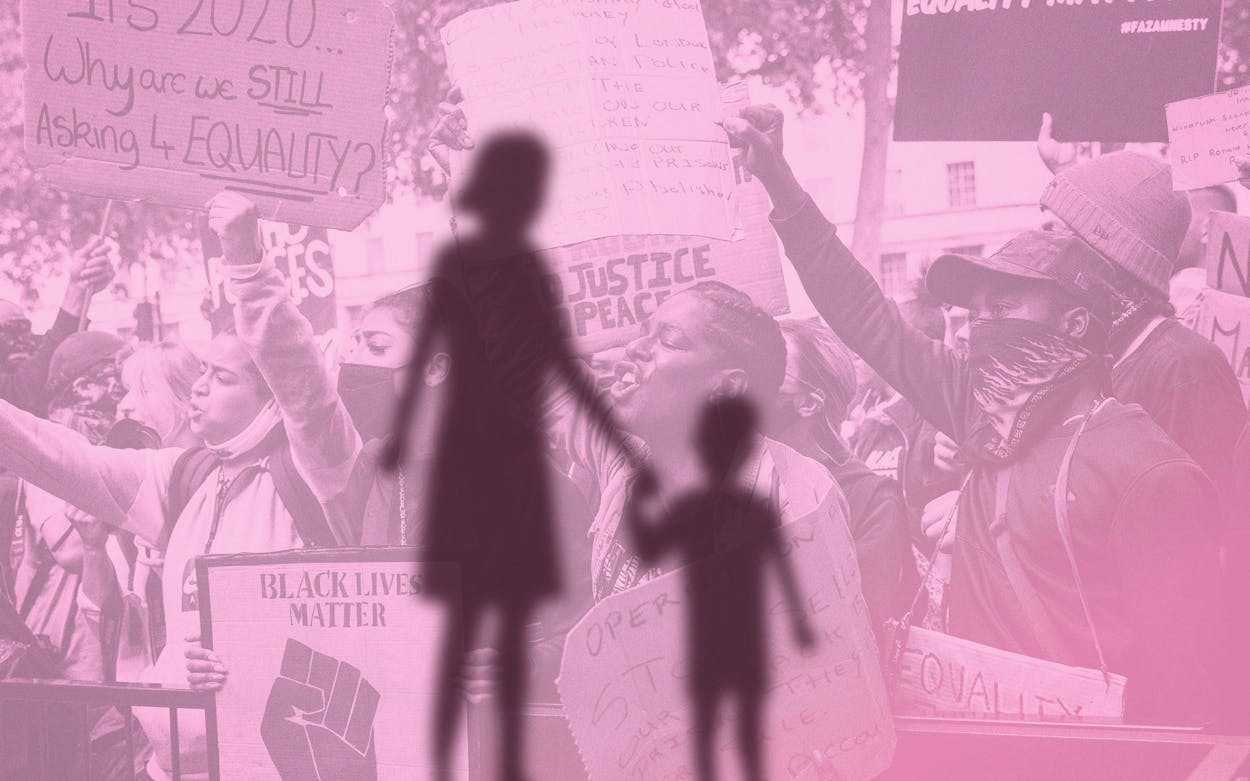I am not in the habit of lying to my children. When my daughter was four, I told her that Santa Claus wasn’t real. Neither was the tooth fairy. She responded: “Then who is gonna give me my money?” She has always been able to decipher the important things and has always had an eye for truth. As a future Black woman, this is both her great blessing and her burden. I have applauded her curiosity, praised her artistic nature, and tried to shield her from the things mothers should. In short, I tried to be a good mother.
So when the pandemic hit, I sat my seven-year-old daughter and her toddler brother down and attempted to explain why we had to stay inside. I told them that they might miss their friends for a while. We sang a wash-your-hands edition of “Baby Shark” to her brother and practiced scrubbing under our nails. We built safety forts together and gave into long tuck-ins at night consisting of prayers and reassurances that this wouldn’t last forever. Despite all of this, it took only a few weeks before their imaginations took hold. My daughter would wake in the night crying, saying how she dreamed the government took me for testing and I never came back. Or how she died of the virus herself. My son began regressing; potty training took a turn for the worse and tantrums broke the sound barrier. Night terrors began their reign. My husband and I even had to spend a few nights sleeping on their floors just to reassure them that we were there and breathing.
When George Floyd was killed by Minneapolis police in late May, I didn’t tell my children. I thought the anxiety surrounding the health crisis carried enough doom. Now was not the right time to burden them with even more worry. But even when we don’t tell them things, children always know. Breaking news bulletins caused my daughter to question why the people on TV had “I can’t breathe” written on their shirts. I tried to change the channel, briefly explaining that “a man was killed and people are upset about it.” In another news interruption, she saw tear gas and protesters. She asked me: “Why are people so angry?” I wanted to have an answer appropriate for a seven-year-old. I also wanted to let her believe that there was more joy in this world than fear.
How do you convince your child that they are safe, when everything around them is in unrest? How do you teach them not to hate, when everything around you wants to push your body into the ground? When the trending video is the death of someone who looks like your father? How do you teach your child to breathe when the world takes your air? I do not always know these answers. I will not pretend I do. But my husband and I also made a promise to each other a long time ago that we wouldn’t lie to our children. That we would face every issue head on with proven facts, or admit our own ignorance and find an answer together.
So I sat her down. I explained that a Black man was killed by the police. That this wasn’t the first time. That Black people in this country, even some children, have gone missing at the hands of the police more times than I would like to own. That this world isn’t always as kind or as safe as I want it to be. Her response leveled me. She said, “I guess my friends were right about the cops; they kill people.”
I want to live in a world where I don’t have to explain that all cops are not the problem, but there have been enough rotten actions to make us distrust the whole bunch. Where my daughter’s recess banter isn’t how to avoid getting killed. A world that doesn’t make her bite her nails down to the nub at the thought of walking outside. She has told me since that she worries the world won’t be kind to her. And I cannot make myself quell these fears. You may have heard of “the talk,” but it is never a one-time conversation. It is an initial eye-opening, followed by a lifetime of failed attempts at hoping we are not seeing it again. And there is no sugarcoating what you see with your own eyes.
I have watched the last few weeks as our country seems to be unravelling in chaos. Whether it is from the increasing unemployment rate, the rising number of cases of COVID-19, or the sobering reality, for so many Americans, that this country has a systemic problem it must address. But one thing I can pass on to her is hope. Some may see the outrage as something less. But outrage by any other name is hope; protest is its ultimate demonstration. Would people who didn’t believe our country could change fight this hard? Would we risk being beaten and pepper-sprayed, only to put ourselves in the path of a deadly pathogen, if we didn’t believe there was room for a more equitable and accepting existence on the other side? A world that might welcome my children with open arms? This freedom to want more is all I have to give them.
This morning, I will sit down at our coffee table here in Houston. I will gather the markers and the glue, and I will help my children craft their own picket signs. Ones that beg for equity. Ones that plead that their lives matter too. Ones that ask the world to let them live long enough to change it.
Deborah D.E.E.P. Mouton, an internationally known writer, educator, and activist, is the author of Newsworthy (Bloomsday Literary) and a poet laureate emeritus of Houston.
- More About:
- Black Lives Matter
- George Floyd






